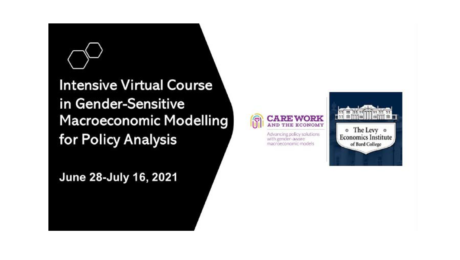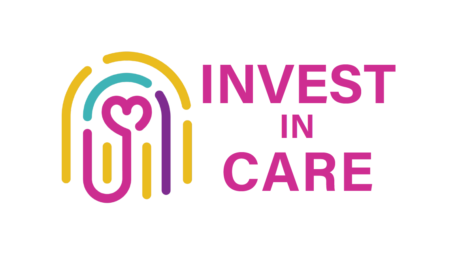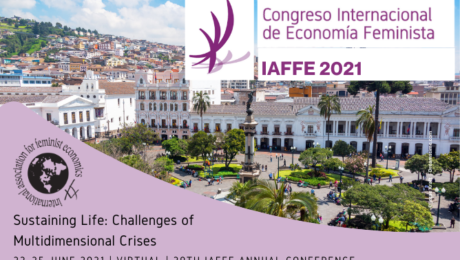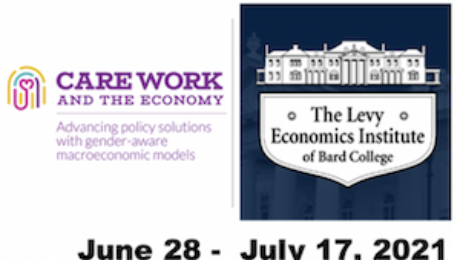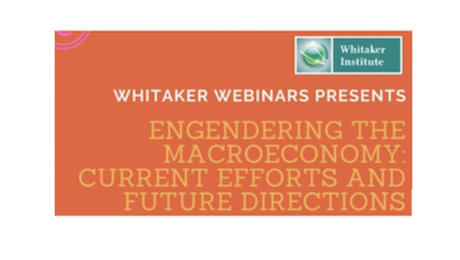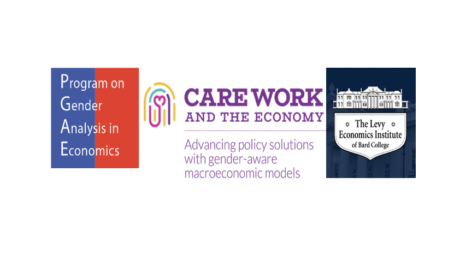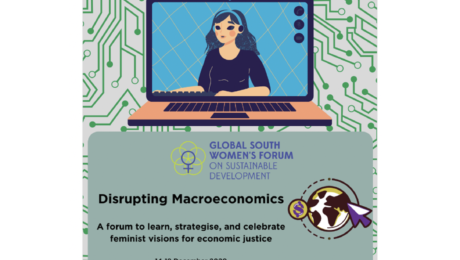Fellows Reflect on Intensive Course in Gender-Aware Macro Modeling
Last month, the Care Work and the Economy project partnered with the Levy Economics Institute at Bard College to host a three-week Intensive Course in Gender-Sensitive Macroeconomic Modelling taught in three time zones. The course aimed to engage our internationally diverse pool of Fellows to enhance capacity building in research and teaching of gender-sensitive economic analysis, focusing on care and macroeconomic policy aspects.
The course was built on four pillars:
1. Understanding and measuring the care economy
2. Adapting social accounting matrices to account for paid and unpaid care activities.
3. The use of information from time-use surveys on unpaid care activities with other relevant sources and information such as national income accounts, labor force surveys, and household or special surveys
4. Performing policy-relevant economic analyses that take systematic account of the interlinkages between care, macroeconomic processes, and distribution.
With 72 Fellows from 22 countries, including Colombia, Ghana, Mexico, Mongolia (to name a few), discussions around course material were perspective-rich and interdisciplinary. Reflecting on the course, many Fellows expressed the desire to integrate the teachings of the intensive course into their research agendas or current positions:
“I am delighted [to be a part of] a fantastic cohort and faculty who want to, and actually do, think critically about [macroeconomic] modelling in a gender-aware or feminist context…I am excited about the possibility of applying what I have learned to Cuban and Latin American contexts, [and] I would like to delve deeper into the Levy Micro-Macro model to analyze gender differences [in] the Ecuadorian context using time-use data.” — Anamary Maqueira Linares, Ph.D. student at University of Massachusetts, Amherst from Ecuador
“Inspired by Professor Folbre’s [lecture], I would like to conduct research using updated time-use surveys (such as the Mexican case)…I would like to explore the differences between time-use patterns in rural areas versus urban ones in Mexico and compare data from 2014 to the recent time-use survey in 2019. I am also organizing a workshop with the Mexican Statistics Agency [to explore] how the Mexican database was built (contrasted with other countries’ surveys) and promote its use among Mexican graduate students and policymakers.” — Dulce Guevara Lopez, consultant at the Mexican Centre for Innovation in Solar Energy
“It was interesting to learn how care and social reproduction interact with gender inequality in the labour market to determine economic growth/development. I think that [this would be] a good research perspective in the African context to see how household commodities and care-time interact with the gender segmented labour market to determine economic growth.” — Dr. Mamaye Thiongane, research associate at the Regional Consortium for Research in Generational Economy (CREG) and lecturer in economics at the Public Economics Laboratory (LEP)
“The discussions around the care diamond gave me a framework to think through the situation of community health workers in India. I plan to apply the Levy model and the care dependency ratio to the time-use survey for India. The course also helped me gather feminist insights to incorporate into the macro course that I teach at university.” — Dr. Anjana Thampi, assistant professor of economics at O. P. Jindal Global University, India
“The course was a fantastic deep-dive into the theory and practice of [macroeconomic] modelling for care, and sparked new ideas for my Ph.D. research. At a time when distances feel huge, the conversations and connections with lecturers and colleagues created a sense of closeness; something I will treasure this summer.” — Maria Sandoval Guzman, Ph.D. candidate in Economics at Curtin University in Australia, and scholar at the Bankwest Curtin Economics Centre and the Women in Social Economic Research Cluster
This course has strengthened the network of researchers around the world dedicated to gender equality and proper care valuation; thank you to all Fellows, Instructors, and Facilitators for their contributions. To learn more about the course, instructors, and Fellows, click here.
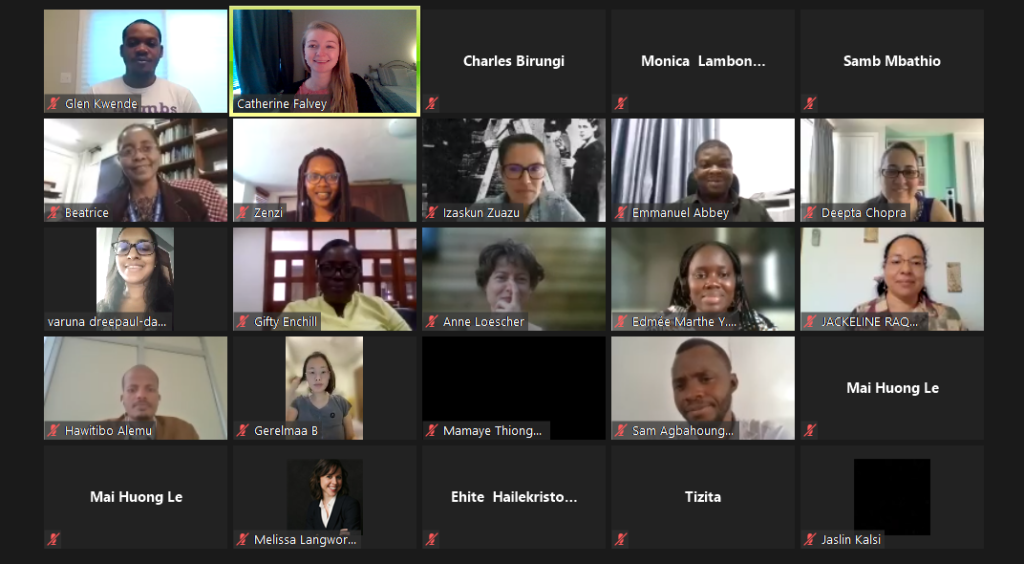
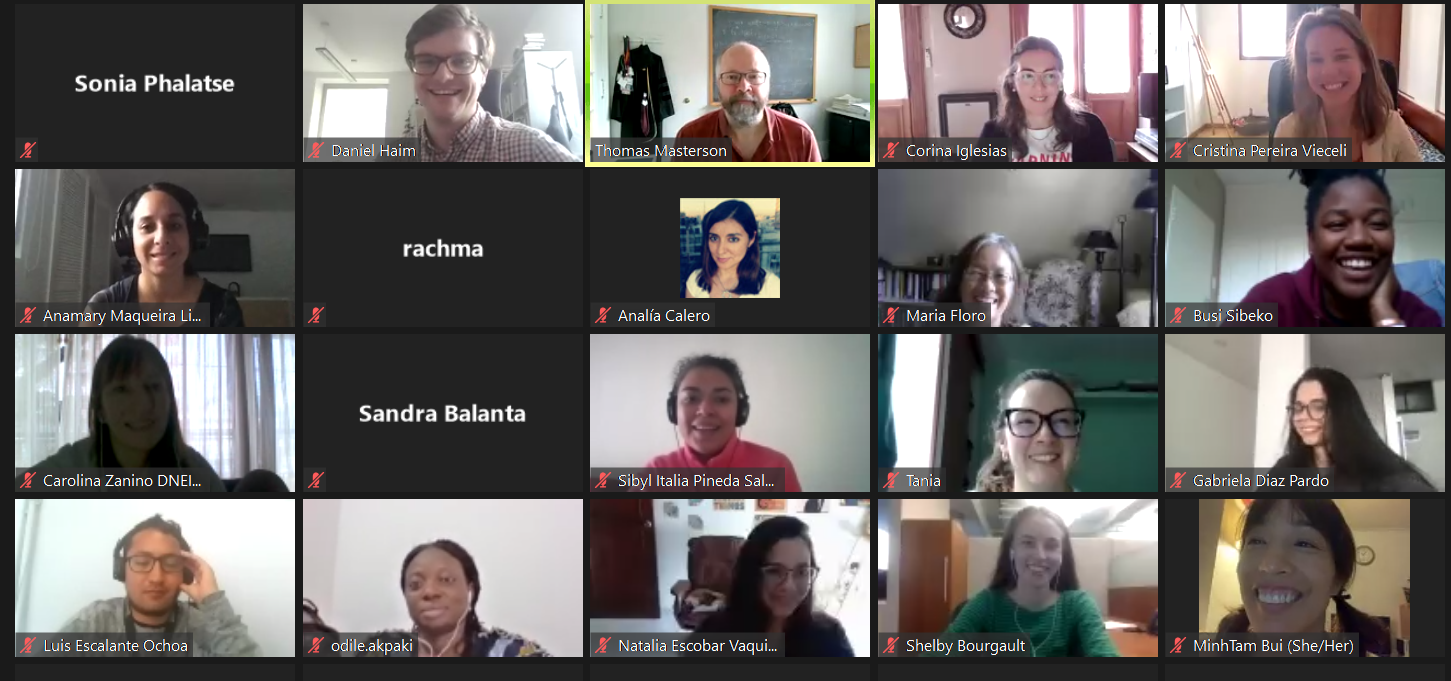
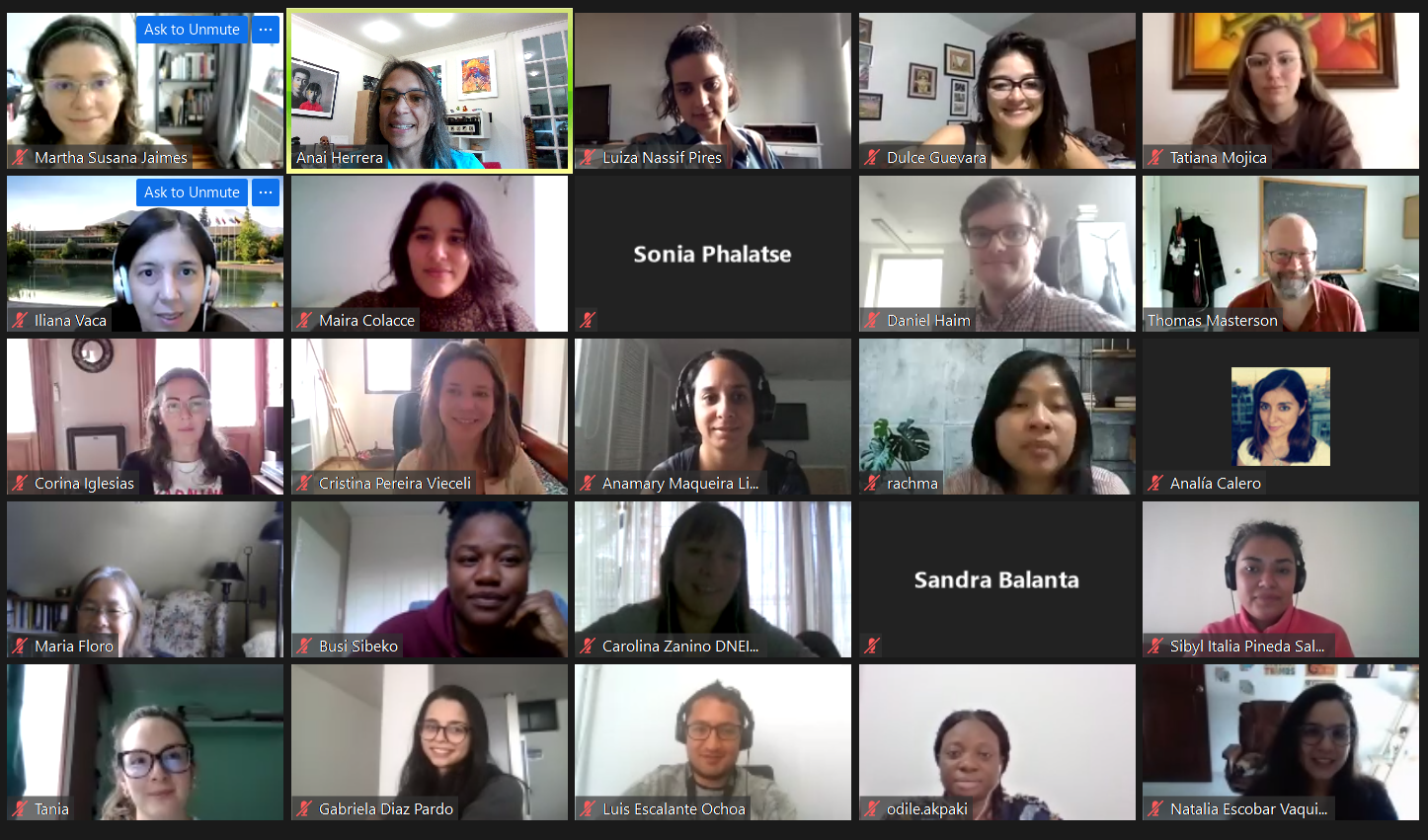
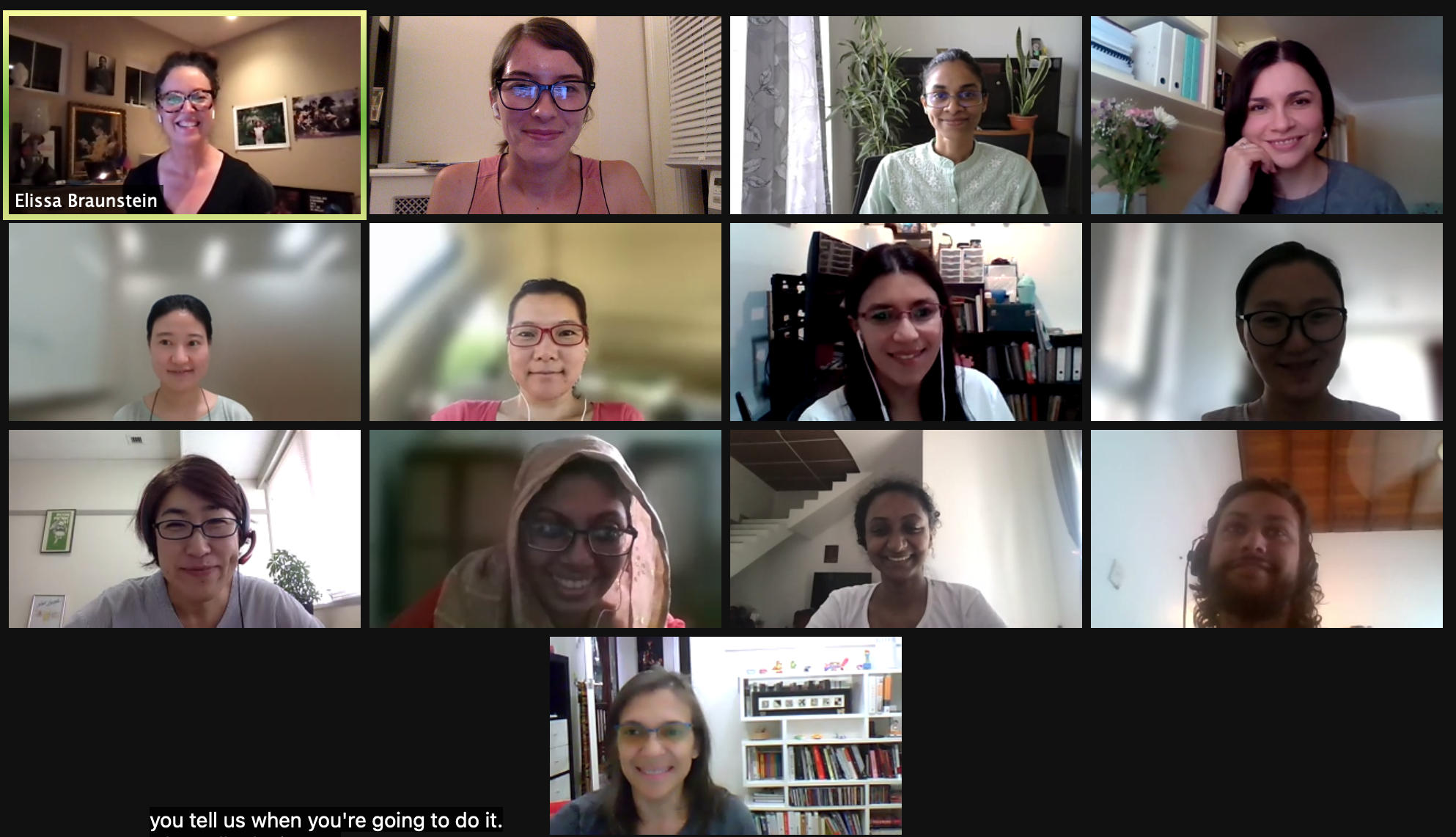
This blog was written by Lucie Prewitt, research and communications assistant for the Care Work and the Economy Project.
Investing in Quality Care has Positive Macroeconomic Effects
Recent research by Lenore Palladino and Chirag Lala of the Political Economy Research Institute (PERI), University of Massachusetts Amherst, examines the effects of critical public investment in childcare, home health care, and paid family and medical leave (PFML) for the U.S. workforce, as proposed by the American Jobs Plan and the American Family Plan by the Biden-Harris Administration.
The authors find that investing in childcare and home health care workforce has positive macroeconomic effects, and the care workforce spends its own money on goods and services through the rest of the economy. They also find that PFML positively boosts the economy, as workers spend the wage replacement income they earn.
The authors model the effects of a $42.5 billion annual investment in childcare and a $40 billion investment in home health care with a minimum wage of $15 an hour and find that the proposed investment can create 564,000 additional jobs throughout the economy, and results in an increase in labor income of $82 billion annually. They find that universal paid family and medical leave, as proposed by the American Families Plan, would increase household income nationally by $28.5 billion, of which $19 billion would be wage replacement directly from the paid leave program, and $9.4 billion would be income earned by workers throughout the economy as people receiving wage replacement spend money on goods and services. This means that for every dollar spent on wage replacement as part of the paid leave program, other workers would earn an additional $.50.
RESEARCH BRIEF: The Economic Effects of Investing in Quality Care Jobs and Paid Family and Medical Leave
This blog was authored by Shirin Arslan, program manager for the Care Work and the Economy Project.
- Published in Care Infrastructure, Child Care, Elder Care, elderly care, Gender-Equal Economy, Healthcare, Macroeconomics, Policy
CWE-GAM Scholars Leading Two Panels During 2021 IAFFE Annual Conference
This week, the International Association for Feminist Economics (IAFFE) will hold its Annual Conference: “Sustaining Life: Challenges of Multidimensional Crises” starting on Tuesday, June 22nd, and concluding Friday, June 25th. This conference will provide a forum for scholars to discuss feminist approaches to constructing “inclusive and resilient economic and political systems and [sustainting] our environment” in the context and aftermath of the COVID-19 pandemic.
The Care Work and the Economy Project will be leading two panel discussions on Wednesday, June 23rd and Thursday, June 24th: “Those Who Care: Improving the Lives of Caregivers and Workers” chaired by Elizabeth King and Ito Peng, and “Seeking Gender Aware Applied modelings: Case of South Korea” chaired by Young Ock Kim. In the discussions, CWE-GAM researchers will present gender-aware macroeconomic models, data collected from unique surveys of care providers and families, and microeconomic simulations used to better understand care work and the economy.
“Those Who Care: Improving the Lives of Caregivers and Workers” is scheduled for Wednesday, June 23rd from 3:30 to 5:00 pm (EDT time) and will contribute to ongoing efforts to “illustrate the intersectionality of care provisioning, economic growth, and distribution.” With an increasing need for care due to the rapid decline in fertility rates and aging population, South Korea offers a unique context to introduce models and analyze surveys given to households, child and eldercare workers.
There will be four papers presented in this panel:
“The Effects of Public Social Infrastructure and Gender Equality on Output and Employment: The Case of South Korea” by Cem Oyvat and Ozlem Onaran “introduces a post-Kaleckian feminist model to analyze the effects of public social expenditure and gender gaps on output and employment building on Onaran, Oyvat, and Fotopoulou (2019), and extending it with an endogenous labor supply and wage bargaining model.”
“The Quality of Life of Family Caregivers: Psychic, Physical, and Economic Costs of Eldercare in South Korea” by Jiweon Jun, Elizabeth King, and Catherine Hensly “examines the psychic, physical, and opportunity costs of caregiving within the family using data from a special-purpose national survey of 501 households conducted in Seoul in 2018.”
“Quality of Care, Commitment Level, and Working Conditions: Understanding the Care Workers’ Perspective” by Shirin Arslan, Maria Floro, Arnob Alam, Eunhye Kang, and Seung-Eun Cha uses “the 2018 Care Work Economy (CWE-GAM) survey data collected from 600 child and eldercare workers in South Korea [to] analyze patterns of commitment levels among [paid carers] in various settings such as private and public institutions as well as in homes of recipients by conducting tobit regressions and entropy econometrics for robustness checks.”
“Impacts of COVID-19 on Work-Family Balance in South Korea: Empirical Findings and Policy Implications” by Ito Peng and Jiweon Jun examines COVID-19’s unequal impact between men and women in South Korea using data from a survey distributed to “1,252 households with at least one child aged between 0 and 12 in June 2020 to find out how the first 2-month social distancing measure had affected their work, childcare arrangements, and their wellbeing.”
“Seeking Gender Aware Applied modelings: Case of South Korea” is scheduled for Thursday, June 24th from 3:30 to 5:00 pm (EDT time), which will share the results of gender-aware applied modelings and micro simulations for South Korea. The panel will discuss which fiscal policies are likely to be the most effective at reducing gender gaps in paid employment and which forms of public investment best contribute to reducing and redistributing unpaid work between genders and socio-economic groups.
There will be three papers presented in this panel:
“Child and Elderly Care in South Korea: Policy Analysis with a Gendered, Care-Focused Computable General Equilibrium Model” by Martin Cicowiez and Hans Lofgren presents the first care-focused and gendered model in the computable general equilibrium literature for Korea that “is built around a social accounting matrix (SAM) that covers non-GDP household services, singles out sectors for child and elderly care, and disaggregates households on the basis on care needs.”
“Care Support Ratios in Korea and the US” by Gretchen S. Donehower and Bongoh Kye takes a holistic view of care by including both paid and unpaid care for all age ranges and “create[s] [care support ratios] to understand the current care market and whether it is sustainable in the future…in two aging populations- Korea and the United States.”
“Towards a Caring and Gender-Equal Economy in South Korea: How much does the regulation of labor market working hours matter?” by Ipek Ilkkaracan and Emel Memis “use[s] a unique time-use survey on care arrangements by couples with small children in order to explore the potential of [the] reduction of full-time market work hours towards [the] narrowing of the gender gaps in paid and unpaid work.”
To learn more about the panels presented by CWE-GAM researchers and the IAFFE conference, please visit the IAFFE 2021 Annual Conference homepage and program.
This blog was contributed by Lucie Prewitt, a research assistant for the CWE-GAM project.
Engendering the Macroeconomy: Current Efforts and Future Directions
On International Women’s Day earlier this month, the Whitaker Institute hosted a webinar titled “Engendering the Macroeconomy: Current Efforts and Future Directions” featuring Dr. Maria S. Floro, Principal Investigator of the Care Work and the Economy Project (CWE) and CWE contributing researcher Dr. Srinivasan Raghavendra. Dr. Raghavendra also serves as Co-PI of DFID funded research on “Economic and Social Costs of Violence Against Women and Girls.” This session was hosted by Dr Nata Duvvury, co-leader of the Gender and Public Policy cluster at the Whitaker Institute.
The webinar focused on exploring what engendering the macroeconomy entails, current efforts, and future directions. The discussion provides insight into ways to bring gender dimensions into macroeconomics by incorporating unpaid and paid care of children, the sick, disabled and the elderly into existing macroeconomic models, the interdependency between the market economy and the care economy, and how gender blindness of macroeconomic models are reflected through every crisis.
This blog was authored by Jenn Brown, CWE-GAM Communications Assistant.
- Published in Economic Recovery, Expert Dialogues & Forums, Gender-Equal Economy, Macroeconomics
Global South Women’s Forum 2020: Disrupting Macroeconomics
A Forum to Learn, Strategize, and Celebrate Visions for Economic Justice
December 14 – 18, 2020
The International Women’s Rights Action Watch (IWRAW) Asia Pacific is hosting this year’s Global South Women’s Forum on Sustainable Development (GSWF 2020) as an online space for learning, strategizing and celebrating feminist visions for economic justice.
IWRAW is inviting proposals to develop and lead thematic sessions at this year’s virtual Global South Women’s Forum on Sustainable Development, 14-18 December 2020. This year’s forum will be themed around feminist macroeconomics, power and justice. IWRAW invites proposals from diverse feminists and social justice activists, organizers, artists, and practitioners from across the Global South to lead and develop sessions. They are particularly interested in hearing from people representing marginalized groups or advocating for underrepresented issues.
This year’s theme is Disrupting Macroeconomics, with a focus on feminist macroeconomics, power, and justice, and the forum will be held online from 14-18 December 2020. Disrupting macroeconomics means shining a light on the connections between the global economy and gender inequality and discrimination – it means reclaiming policy spaces at all levels and demanding that the global economy be redesigned to advance equality, human rights, and international solidarity.
The deadline for submissions is 12 November 2020.
Visit IWRAW Asia Pacific’s blog post for more details on the theme, how to submit your proposals, and funding opportunities. If you have any questions, please feel free to contact IWRAW at gswf2020@iwraw-ap.org (with a copy to constanza@iwraw-ap.org).
- Published in Forums, Macroeconomics



